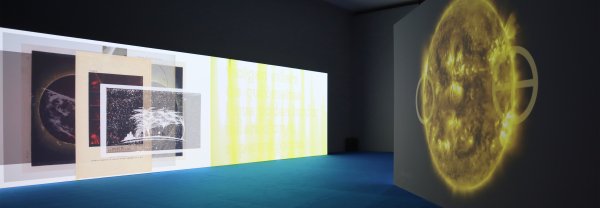Felix Gonzalez-Torres
Felix Gonzalez-Torres was born in Guáimaro, Cuba, in 1957. He studied art at the University of Puerto Rico and in New York from 1979. He died in Miami in 1996 after a long struggle against AIDS, something that profoundly marked his work. Both his private and public life were affected by his involvement in social and political causes. From 1987 to 1991 he was part of Group Material, a pioneering artist collective formed by Dough Ashford, Julie Ault and Tim Rollins, based in New York and engaged in communal education and cultural activism. Gonzalez-Torres’ aesthetic approach may be related to Bertolt Brecht’s theories on epic theatre, according to which creative expression turns the viewer into an active observer to bring about social transformation. Using simple, everyday materials such as strings of lightbulbs, clocks, piles of paper and even sweets, the Minimalist language of his sculptures and installations addresses universal subjects such as love, desire, loss, illness and gender.
Following his first solo exhibition in 1984, Gonzalez-Torres’ work has been exhibited in numerous art centres in Europe and the United States. Major retrospectives include those at the Museum of Contemporary Art (MOCA), Los Angeles, 1994; Solomon R. Guggenheim Museum, New York, 1995, later travelling to the Centro Galego de Arte Contemporánea, Santiago de Compostela, and ARC-Musée d’Art Moderne de Paris; Wiels Centre d’Art Contemporain, Brussels, 2010, later travelling to the Fondation Beyeler, Basel, and the Museum für Moderne Kunst, Frankfurt. In 2007, he represented the United States at the Venice Biennale. In 2020, MACBA hosted the exhibition Felix Gonzalez-Torres: The Politics of Relation.





![[Sin título]](https://img.macba.cat/public/styles/large/public/imagenes/archivo/documento_archivo_A05079.jpg?itok=9b68Svsz×tamp=1591661383)
![[Sin título]](https://img.macba.cat/public/styles/large/public/imagenes/archivo/documento_archivo_A06992.jpg?itok=6VyZ-b4_×tamp=1593916786)
![[Sin título]](https://img.macba.cat/public/styles/large/public/imagenes/archivo/documento_archivo_A06993.jpg?itok=WVc6RGW3×tamp=1593916787)
![[Sin título]](https://img.macba.cat/public/styles/large/public/imagenes/archivo/documento_archivo_A00694.jpg?itok=ltlswGJ0×tamp=1675156076)

